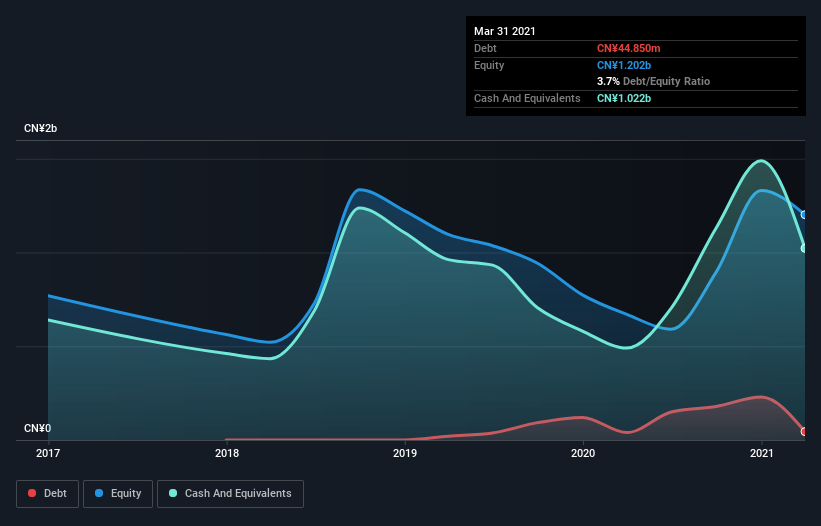- United States
- /
- Food and Staples Retail
- /
- NasdaqGM:YI
Health Check: How Prudently Does 111 (NASDAQ:YI) Use Debt?

The external fund manager backed by Berkshire Hathaway's Charlie Munger, Li Lu, makes no bones about it when he says 'The biggest investment risk is not the volatility of prices, but whether you will suffer a permanent loss of capital.' So it might be obvious that you need to consider debt, when you think about how risky any given stock is, because too much debt can sink a company. We note that 111, Inc. (NASDAQ:YI) does have debt on its balance sheet. But the real question is whether this debt is making the company risky.
When Is Debt A Problem?
Debt and other liabilities become risky for a business when it cannot easily fulfill those obligations, either with free cash flow or by raising capital at an attractive price. In the worst case scenario, a company can go bankrupt if it cannot pay its creditors. However, a more frequent (but still costly) occurrence is where a company must issue shares at bargain-basement prices, permanently diluting shareholders, just to shore up its balance sheet. Of course, plenty of companies use debt to fund growth, without any negative consequences. When we think about a company's use of debt, we first look at cash and debt together.
View our latest analysis for 111
What Is 111's Debt?
You can click the graphic below for the historical numbers, but it shows that as of March 2021 111 had CN¥44.9m of debt, an increase on CN¥39.7m, over one year. However, its balance sheet shows it holds CN¥1.02b in cash, so it actually has CN¥977.5m net cash.

How Strong Is 111's Balance Sheet?
Zooming in on the latest balance sheet data, we can see that 111 had liabilities of CN¥1.75b due within 12 months and liabilities of CN¥130.0m due beyond that. On the other hand, it had cash of CN¥1.02b and CN¥267.1m worth of receivables due within a year. So its liabilities total CN¥588.1m more than the combination of its cash and short-term receivables.
Of course, 111 has a market capitalization of CN¥3.29b, so these liabilities are probably manageable. But there are sufficient liabilities that we would certainly recommend shareholders continue to monitor the balance sheet, going forward. While it does have liabilities worth noting, 111 also has more cash than debt, so we're pretty confident it can manage its debt safely. When analysing debt levels, the balance sheet is the obvious place to start. But it is future earnings, more than anything, that will determine 111's ability to maintain a healthy balance sheet going forward. So if you're focused on the future you can check out this free report showing analyst profit forecasts.
Over 12 months, 111 reported revenue of CN¥9.2b, which is a gain of 89%, although it did not report any earnings before interest and tax. Shareholders probably have their fingers crossed that it can grow its way to profits.
So How Risky Is 111?
Statistically speaking companies that lose money are riskier than those that make money. And the fact is that over the last twelve months 111 lost money at the earnings before interest and tax (EBIT) line. And over the same period it saw negative free cash outflow of CN¥290m and booked a CN¥479m accounting loss. With only CN¥977.5m on the balance sheet, it would appear that its going to need to raise capital again soon. With very solid revenue growth in the last year, 111 may be on a path to profitability. Pre-profit companies are often risky, but they can also offer great rewards. There's no doubt that we learn most about debt from the balance sheet. However, not all investment risk resides within the balance sheet - far from it. Case in point: We've spotted 2 warning signs for 111 you should be aware of, and 1 of them is significant.
At the end of the day, it's often better to focus on companies that are free from net debt. You can access our special list of such companies (all with a track record of profit growth). It's free.
If you decide to trade 111, use the lowest-cost* platform that is rated #1 Overall by Barron’s, Interactive Brokers. Trade stocks, options, futures, forex, bonds and funds on 135 markets, all from a single integrated account. Promoted
If you're looking to trade 111, open an account with the lowest-cost platform trusted by professionals, Interactive Brokers.
With clients in over 200 countries and territories, and access to 160 markets, IBKR lets you trade stocks, options, futures, forex, bonds and funds from a single integrated account.
Enjoy no hidden fees, no account minimums, and FX conversion rates as low as 0.03%, far better than what most brokers offer.
Sponsored ContentNew: AI Stock Screener & Alerts
Our new AI Stock Screener scans the market every day to uncover opportunities.
• Dividend Powerhouses (3%+ Yield)
• Undervalued Small Caps with Insider Buying
• High growth Tech and AI Companies
Or build your own from over 50 metrics.
This article by Simply Wall St is general in nature. We provide commentary based on historical data and analyst forecasts only using an unbiased methodology and our articles are not intended to be financial advice. It does not constitute a recommendation to buy or sell any stock, and does not take account of your objectives, or your financial situation. We aim to bring you long-term focused analysis driven by fundamental data. Note that our analysis may not factor in the latest price-sensitive company announcements or qualitative material. Simply Wall St has no position in any stocks mentioned.
*Interactive Brokers Rated Lowest Cost Broker by StockBrokers.com Annual Online Review 2020
Have feedback on this article? Concerned about the content? Get in touch with us directly. Alternatively, email editorial-team (at) simplywallst.com.
About NasdaqGM:YI
111
Operates an integrated online and offline platform in the healthcare market in the People's Republic of China.
Undervalued with excellent balance sheet.
Similar Companies
Market Insights
Community Narratives


